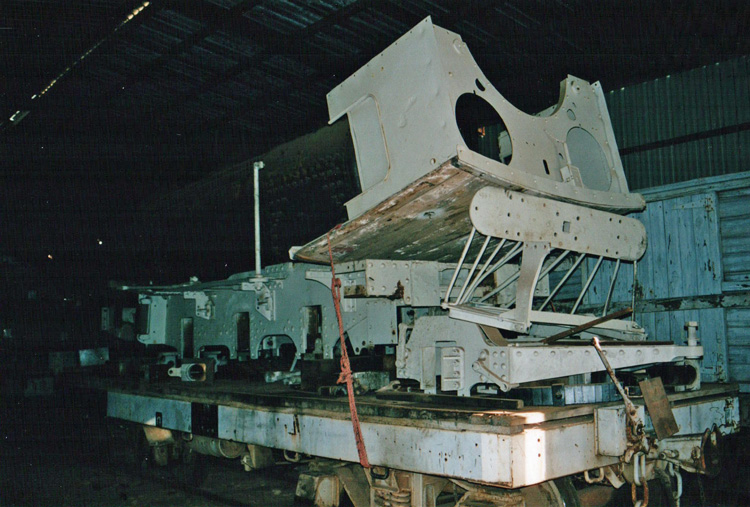|
|
Wx 18 Pichi Richi Railway |
|

My visit to the Pichi Richi Railway's workshops at Quorn in
June 2000 found the dismantled components of Wx 18 stored on a flat car.
|
Builder |
Manchester |
|
Builder’s Number & Year |
1820
of 1879 |
|
Wheel Arrangement |
2-6-0 |
|
No. in class |
35 |
|
The South
Australian Railways (SAR) W-class 2-6-0 locomotives first entered service in
1878. These locomotives were built by Beyer Peacock & Co, Manchester and
35 were in service by 1883, becoming the principal motive power on the SAR's
narrow-gauge lines at that early stage. As originally constructed, they
featured a round-top boiler and a tall steam dome, together with refinements
such as ornate Salter safety valves and a brass chimney cap. A small
four-wheel tender provided for coal and water needs. This
successful Beyer Peacock & Co design was much the same as the West
Australian Government Railways A-class locomotives. The design was developed
by Beyer Peacock & Co to become the highly successful Y-class 2-6-0
pattern (such as preserved Y 97),
which saw service across most Australian narrow-gauge rail systems. W-class
operations included the route from Port Augusta through the Pichi Richi Pass
to Quorn and Hawker, with a number also used by contractors during the
construction of the SAR narrow-gauge lines. Eight W-class locomotives were
transferred to Commonwealth Railways ownership on 1 January 1911 for use on
the North Australia Railway from Darwin, where they were known as the
NF-class. Of these, NF 5 (originally
W 53) survives as an operable museum exhibit at Katherine. On the
South Australian Railways, 17 class members were rebuilt with higher-pressure
boilers between 1903 and 1912 to become the Wx class. Preserved
locomotive Wx 18 was built by Beyer Peacock & Co, Manchester in 1879,
originally carrying the road number W 18. It was rebuilt to Wx specification
in 1911. While most of the SAR W and Wx class locomotives were withdrawn and
scrapped around 1929, four class members (Wx 18, 20, 37 and 56) were retained
in the South-East division to work the Kingston - Naracoorte line. This route
was converted to broad gauge in 1959, with Wx 18 operating the last
narrow-gauge goods train from Kingston to Naracoorte on 12 March 1959.
Fortunately, it was saved for preservation and transferred to Naracoorte in
April 1959 for display in Pioneer Park together with 0-4-4 loco V 9, another fascinating old SAR
narrow-gauge survivor. Wx 18 was
acquired by the Pichi Richi Railway in 1985 and transferred to Quorn for
restoration. It has been fully dismantled with the major parts cleaned and
painted, but restoration progress appears to have stalled. My visit to the
Pichi Richi Railway's workshops at Quorn in June 2000 found Wx 18 stored
dismantled on a flat car. Also stored nearby was a newly constructed rivetted
tender tank. Perhaps some impediment to restoration was identified, such as
extensive - and expensive - boiler renewal? Further information on this point
is welcome. Hopefully
the restoration of this interesting early locomotive will soon restart. Its
relatively low power would presumably reduce its usefulness in operation, but
it would be a magnificent historical asset for the Pichi Richi
Railway given the W-class association with the early SAR operations
through the Pichi Richi Pass. The Pichi Richi Railway is known for the high
authenticity and attention to detail applied to their restoration projects
and accordingly a restored Wx 18 would present a wonderful example of early
South Australian Railways steam power. Given its age and links to the
earliest days of railway operations through the Pichi Richi pass, Wx 18 would
be a worthy recipient for grant funding! As an alternative, if there are insurmountable
technical issues preventing a return to steam, perhaps it could be
reassembled for static display at Quorn. It would also make a worthy exhibit
at the National Railway Museum in Port Adelaide. The Pichi
Richi Railway website locomotive pages provide further information for this wonderful
old locomotive. |
References
|
a |
Fluck
R. E., Sampson R., & Bird K. J. 'Steam locomotives and Railcars of
the South Australian Railways', published
by The Mile End Railway Museum (SA) Inc, 1986. |
|
b |
Webmaster's
observation or comment. |
Page updated: 2 September 2025
|
Government Railways: |
|
|||||||||
|
Private & Industrial Railways: |
|